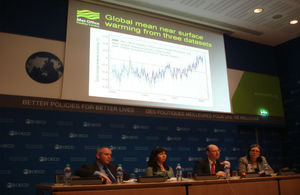How can we limit dangerous climate change?
According to the UK and OECD experts, it’s getting more difficult and expensive the longer we delay action.

R-L: Ian Wood, UK Delegation to the OECD; Kirsty Lewis and Jason Low, Met Office Hadley Centre; Helen Mountford, OECD
Now it’s not so much a question of avoiding dangerous climate change but of acting now to limit it however we can.
The Hadley Centre, part of the UK Meterological Office, visited the OECD to present their latest research on climate projections and impacts. At a lunchtime seminar attended by OECD and International Energy Agency (IEA) staff, the Hadley Centre noted that, without concerted international action, rising carbon dioxide emissions could lead to a global mean temperature rise of more than 5 °C by 2100 – regionally in excess of 10 °C, but that the scale of climate change is greatly reduced with early and rapid reductions in emissions. The Centre’s work also shows that human influence has increased the odds of extreme weather events in some cases.
A significant part of the Hadley Centre’s work is linked to climate forecasting, monitoring, and gathering the evidence needed to inform international policy and mitigate dangerous climate change. Crucially, they are also looking at how climate change could impact on real people’s lives. According to the Hadley Centre, if unmitigated and temperatures rise by 4 degrees Celsius, an additional 975 million people could face difficulties in finding water and the yield of crops could drop by 18 per cent. There will also be impacts on the global energy structure and global commodity change.
Helen Mountford from the OECD’s Environment Directorate emphasised that the OECD relies heavily on the work of climate scientists like the Hadley Centre to underpin their analysis. The OECD (with its sister body the IEA) plays a key role in working on cross-cutting aspects of climate policy, including examining the impact of climate change on trade and tax as well as critical work on mobilising climate finance .
To find out more about the work of the Hadley Centre, visit their webpage.